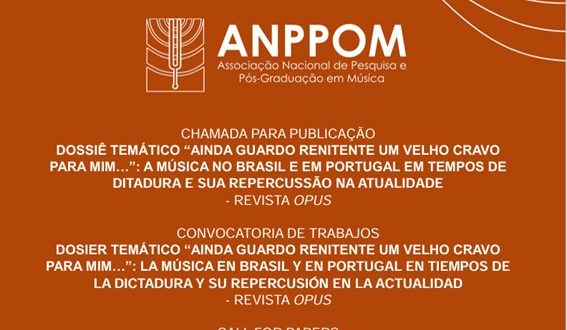Call for Papers – Dossier “Ainda guardo renitente um velho cravo para mim…”: Music in Brazil and Portugal during times of dictatorship and its repercussions today
In the year marking 60 years since Brazil’s military coup and 50 years since Portugal’s Carnation Revolution, the dossier titled “Ainda guardo renitente um velho cravo para mim…” [Still, I resolutely keep an old carnation for myself…]: Music in Brazil and Portugal during times of dictatorship and its repercussions today, aims to initiate a dialogue on the role of music and its social actors during the dictatorships of these countries, as well as their contemporary implications.
Additionally, the dossier complements other academic and cultural initiatives scheduled for 2024 on this topic. Considering that 2024 marks 60 years since the coup that established a military dictatorship in Brazil and 50 years since Portugal’s Carnation Revolution — an event that sparked the movement towards democratization after over 40 years of dictatorship — we are prompted to ponder the role of music and musicians in these two realities.
Both regimes relied on repression and censorship to control culture and suppress any risk of insurgency. Notably, Portugal’s dictatorial regime unfolded in two phases: the first, with a military coup in 1926 that ousted the liberal-republican regime, ending the First Republic; and the second, with the adoption of a new constitution via national plebiscite in 1933, inaugurating the Estado Novo [New State] and the Salazarist era. Eventually, the military dictatorship transitioned into a constitutional dictatorship until April 25, 1974, when the iconic Carnation Revolution occurred.
Meanwhile, in Brazil, the 1964 coup emerged amidst the anti-communist fervor that swept Latin America after the 1959 Cuban Revolution. Military leaders, trained at the Escola Superior de Guerra [War Academy] and under strong U.S. influence, finally executed the coup d’état that had been brewing since 1954. It became a civil-military action given the support from the economic elite and segments of the middle class, enduring for about 20 years, undermining democratic principles as it subjected liberals and even conservatives to torture and censorship.
Among Portuguese musicians, several figures stand out for their opposition to the fascism of the Estado Novo regime, including Zeca Afonso, José Mário Branco, Sérgio Godinho, and Fernando Lopes-Graça. Despite operating within different aesthetic realms, their voices resonated with the longing for freedom of expression and, consequently, the end of anti-democratic measures. Particularly in the case of Lopes-Graça, his trajectory was marked by the challenging coexistence with his activities as a member of the Communist Party, resulting in serious professional and emotional repercussions, such as being 8 denied a scholarship in Paris (1934), imprisonment in Caxias prison for 224 days (1936), and the revocation of his teaching credentials (1954). Much of his work only gained widespread dissemination and recognition after the revolution of April 25, 1974.
In Brazil, the 1964 military coup brought about a transformation across the entire cultural landscape, particularly in music. In the realm of popular music, Bossa Nova began sharing the spotlight with politically charged songs, often showcased in televised Song Festivals. This period saw attempts to establish direct and immediate communication with society, not only through politically infused lyrics but also through musical elements drawing from Brazil’s rich popular culture. Tropicalismo emerged as a movement that blurred the lines between national and foreign influences, tradition and modernity, and art and entertainment. A similar trend emerged in classical music, with groups like the Bahia Composers Group or the Música Nova Group advocating for musical resistance through experimental and avant-garde composition. Both popular and classical music spheres faced varying degrees of suppression by the dictatorship. It is worth noting that the military’s targets extended beyond explicit political dissent to encompass behavioral dissent as well. This led to the dismissal of professors advocating for avant-garde music at the newly founded University of Brasília and the arrest of notable figures such as Rita Lee, Caetano Veloso, and Gilberto Gil, among others.
During the period when dictatorships prevailed on both sides of the Atlantic, and particularly after the “25th of April,” Brazilian musicians penned songs that either engaged in dialogue or drew inspiration from the situation in Portugal. This is evident in works such as “Os Argonautas” (1969), where Caetano Veloso, imprisoned and facing imminent exile, expresses his inability to see the port three times; “Tanto Mar” (1975), where Chico Buarque yearns for “a whiff of rosemary,” and “Um fado” (1977), composed by Ivan Lins and Vitor Martins, which alludes to women “counting on their fingers the children missing in the vineyards” and, in its conclusion, modifies Pessoa’s famous verse to assert that “To live is necessary.” The dictatorships have ended, yet their legacies persist in Portuguese and Brazilian societies.
With this acknowledgment, this dossier aims to problematize both the presence of music and its social actors during these periods, as well as their implications for the present day.
Guest editors:
Guilhermina Lopes (CESEM – Universidade Nova de Lisboa)
Fernando de Oliveira Magre (Faculdade de Música do Espírito Santo)
Ana Cláudia de Assis (Universidade Federal de Minas Gerais)
Calendar:
Paper submission deadline: July 10, 2024
Final announcement deadline for approved papers: August 31, 2024
Dossier publication date: November 30, 2024
Submissions should be made via the Opus system at https://www.anppom.com.br/
Submitted papers must adhere to the Author Guidelines of the Opus journal, available at https://www.anppom.com.br/
Opus serves as the scientific journal of ANPPOM – the National Association of Research and Graduate Studies in Music (Brazil). It’s a serial publication dedicated to disseminating the plurality of knowledge in music, covering practical, theoretical, historical, political, cultural, and interdisciplinary aspects, while also fostering the exploration of new methodological perspectives. Founded in 1989, Opus operates as an electronic journal, releasing annual editions and accepting articles in Portuguese, Spanish, and English on an ongoing basis.
Opus is indexed in RILM, Latindex, Web of Science, DOAJ, and Scopus.
Mónica Vermes, Editor Opus publicacoes@anppom.org.br

